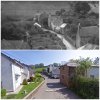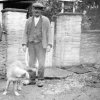Saturday 11th August 1945
Well, there has been another one. The day before yesterday. It was a place called Nagasaki. I have never heard of it before. Nor Hiroshima, come to that. The only place in Japan I have ever known about is Tokyo. That's the capital. To me, it's all as far away as the moon.
Dad says that the Japs can't possibly carry on after this. So it looks as though the war is nearly over.
Anyway, that's a long, long way away. I promised to tell you more about where we are and what we are doing. You might ask "What's all that got to do with Birmingham?" I would say, only a bit, really. But we are Brummies, even though we are here in Devon, Dad says that he always bumps into a lot when he's here on holiday - and I have met THREE myself! (Not this time, though. That was four years ago when, somehow or other, dad got us down here to stay in the farm which he and all of us had gone to for years before the war. These three Brummies were brothers. The youngest was about my age. They were evacuees. They came from a part of Birmingham called Ladywood. I had never heard of that before. It sounded a lovely place. I could see in my mind pretty ladies in coloured dresses, sitting around on the grass in a clearing, the sun shining and dense, green woodland all around them. I wonder if they have gone home yet. They can't still be at the farm and I'll tell you why another time).
And, oh yes, I remember now, there has been a gentleman and his wife who Dad and Mum got talking to. I'm not sure where in Birmingham they come from. It's their first visit. The lady said she liked Devon but couldn't stand "all them high hedges". They stopped her seeing the scenery. Mum and Dad had a chuckle about this afterwards. I think what they like as much as anything ARE the hedgerows!
Beeson, where we are, is a tiny village, about a mile from the sea. This is almost all of it.
View attachment 147461
We are in the cottage right in the middle of the picture. Our rooms are on the right-hand side. The bedroom, where I sleep with Mum and Dad (on a little camp bed) is the top window. Below, the window of our sitting and dining room.
It's a super place. In the garden there are flowers and vegetables and a lovely row of sweet peas which Mrs. Honeywill cuts for the house. There is also a bush with huge fruit on it which I've never heard of before, it's called a loganberry. Dad says it's half way between a rasberry and a strawberry.
The food is lovely. I have had fresh crab for the first time and love it. We also have chicken, fish and all sorts of other things. And loads of Devonshire cream. Mrs Honeywill has a big bowl on her scullery floor which she makes it in. The crabs are absolutely huge. I think they are called King Crabs and they all come from a village about a mile away.
This is a picture of our village from the other direction, with the back of our cottage near to us, on the right-hand side.
View attachment 147462
You can see that there aren't many houses. Opposite us are the gardens of some other cottages and they all seem to me so lush, everything packed closely together, rows of peas and beans and carrots and cauliflowers and other nice things. The cottage we are in is part of a farm which you can't see on the picture. You get to it either down a little lane or through a gate by the back door of our cottage. They have cows and grow a lot of corn. Mr. Honeywill is one of the farmer's sons. He has a brother, John. And sisters. I think they still live at the farm with the mum and dad. Also on the farm is a German prisoner of war. I think he is a nice man but I've never met him. I've seen him working away, in the distance, with his blond hair and looking as brown has a berry. I don't know his name. I wonder if he is happy and when he'll be able to go home.
I think Mr. Honeywill had been in the Army. There's a picture of him on the wall, in a great big greatcoat and looking a bit sad. But he's home now.
If you walk along the lane in the direction we are looking, for about twenty minutes, you go along a flattish bit first of all and then the lane suddenly dives down, ever so steeply, going round one or two very sharp hairpins until you reach sea level. (There is a very sharp bend, just like these, in the middle of Beeson. That one got made a bit less sharp by the Americans when they were here. They couldn't get their big Army lorries around it. But it looks as though they had to put up with these, further on towards Beesands).
After the bends and the road has flattened out, it's just a few yards to the village of Beesands. This is a sleepy little place which is just a long row of fishermen's cottages with the front doors straight onto the road. On the other side of the road the shingle starts and then slopes right down to the water. The men here all fish for crabs. They have open boats for one or two people with an engine in. You can see their round crabpots all over the place. And lines of bait drying and waiting to be used. At first you wonder how they get these heavy boats out of the sea and up the beach. The answer is a lot of chains and, all along the beach, little tiny sheds which aren't much more than big boxes. I've had a look in one of these. Inside was a very old car engine. When they start it up, the engine drives a big drum which one of the chains is attached to and as it goes round and round, it pulls the boat up the beach. It all looks very clever to me. But a bit rusty.
This is a picture of Beesands. It's a pity you can't see much of the beach and the boats and all the other stuff.
View attachment 147463
Halfway down the row of cottages is a pub, called The Cricket. It's small and everybody crowds into the bar. I expect it is busier than usual with the visitors, which include my mum and dad quite regularly! I sit outside with a glass of lemonade and a packet of Smith's crisps with its little blue bag of salt. (Children can't go into pubs, of course). I'm quite happy. There's plenty to look at and especially the sea. As you look out in that direction, to the right, around the headland, is another village called Hallsands. And, to the left, at the far end of the long beach and around another headland, the village of Torcross and beyond it Slapton Sands. I'll probably tell you later about what I saw in both these places. But let's stay in Beesands for a moment. It's so quiet and peaceful, especially in the evening, and you think that nothing could ever happen here. But then, almost next door to the pub, you see there is a big gap in the row of cottages. And a wrecked cottage where there's a large car parked. I think it's the local taxi. Bombing didn't just happen in Birmingham. It happened here. One day a plane came and dropped a bomb, just here. At least one cottage was destroyed and a person killed. We sometimes see walking along the lanes, being helped by a member of his family, an elderly gentleman (well, he looks elderly to me) who is blind. I think he lost his sight when the bomb fell. Dad offered him a lift one day but he said, no thank you, he enjoyed walking.
And we do, as well. Dad never takes the car down to Beesands. We always walk. Going is okay. But coming back is hard work. The lane is so steep that I wonder if our car would ever get up it. (Dad sometimes tells me the story about a place called Clovelly where, when he was there years and years ago, the road was so steep that some cars had to reverse up it because they couldn't get up it going forwards. I wonder if any of them belonged to Brummies). Our lane isn't quite as bad as that, but you never know!
But the coming back, even though the hill is so steep, is nice. That sometimes happens at dusk. We will have gone to The Cricket after supper. As you climb the hill you can still hear the waves breaking on the beach behind you, and, if you listen carefully enough, you might even hear the hiss of the shingle as the water flows back after it. Gradually that all fades. Then there's almost nothing apart from ourfootsteps. Just some clicking in the hedgerow as a grasshopper or cricket gets ready for bed after a busy day amongst the hawthorn and the hazel. The scent of honeysuckle hits you as it gets stronger in the evening air. And the hedgerow starts to show pinpoints of light as the glowworms become visible. There are a couple of cottages, further on, and you can usually get a whiff of wood smoke as you walk past. It's a lovely smell. I think that the people who live there use wood for cooking. They certainly don't need it for heating, on an evening like this.
Then back into the cottage. The door is never locked. There's a light on. (We have electricity here. And a proper bathroom). I'm worn out. The heat, the exercise, the fresh air. So straight up to bed whilst Mum and Dad have the last natter of the day downstairs. I'll be fast asleep before they come up.
I do like holidays.
Chris










